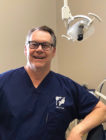The Internationally recognized specialty of Oral and Maxillofacial Surgery (OMFS) has its historic origins through innovations arising from the care of the wounded in theatres of global conflict. The combined skills of Medicine and Dentistry that were acquired through these unfortunate human events, rapidly expanded the scope of the OMFS specialty. Currently, the education of individuals within this unique specialty will frequently encompass up to fifteen years of post-secondary, graduate, post-graduate and fellowship training.
The scope of the Specialty of OMFS currently ranges from dentoalveolar surgery, facial trauma management, complex congenital and acquired facial deformity correction, minimally invasive endoscopy and total replacement of the temporomandibular joint on to pathology and ablative and oncologic and reconstructive surgery. Sophisticated cranio-facial and orthognathic surgical techniques and distraction osteogenesis coupled with free and vascularized tissue grafting in combination with dental implant technology and cosmetic surgery, anesthesia and sedation reflect a remarkable coalescence of competencies and specialty evolution directed toward excellence in patient care and quality of life.
However, the public and health care professions perception and awareness of the OMFS specialty has not always kept pace with this rapidly expanding scope of practice. Over the past twenty-five years, numerous studies have documented this fact. These studies have concluded that many health professionals have a lack of understanding about the wide scope of surgical procedures that OMFS offers and this lack of knowledge may have altered their referral patterns. A recent Canadian survey by Dr. Oscar Dalmao at the University of Toronto’s Oral and Maxillofacial Program, indicated that a significant portion of the general population are still unacquainted with our specialty and many physicians and dentists are unfamiliar with that fact that OMFS repaired other bones of the face and skull beyond the maxilla and mandible.
The specialty of Oral and Maxillofacial stands poised at the collaborative intersection of dentistry and other medical specialties such as Ear, Nose and Throat, Head and Neck Surgery and Plastic Surgery. Health care agencies and providers may be uninformed or confused as to the expertise and wide range of quality treatments provided by Oral and Maxillofacial Surgeons.
Historically, OMFS have been content to allow their personal caring, demonstrated skill and patient outcomes, speak for themselves and their specialty. In these modern electronic times, this somewhat colloquial and anachronistic communication strategy may well deserve revisiting. Perhaps using the advantages of current technologies, fellow care providers and patients can become increasing aware of this remarkable specialty. In this way, the varied skills and expertise that Oral and Maxillofacial Surgeons possess and are willing to collaboratively and compassionately share with their fellow professionals, will continue to provide benefit to our mutual, deserving patients.
About The Author
 Dr. Bruce R. Pynn is Oral Health’s editorial board member for Oral and Maxillofacial Surgery. He maintains a private practice in Thunder Bay, ON. He is an Associate Professor, North Ontario School of Medicine, Lakehead University, and Chief of Dentistry, Thunder Bay Regional Health Sciences Centre. He is also the Past President of the Ontario Society of Oral and Maxillofacial Surgery. He also served as President of the Ontario Society of Oral and Maxillofacial Surgery in 2017.
Dr. Bruce R. Pynn is Oral Health’s editorial board member for Oral and Maxillofacial Surgery. He maintains a private practice in Thunder Bay, ON. He is an Associate Professor, North Ontario School of Medicine, Lakehead University, and Chief of Dentistry, Thunder Bay Regional Health Sciences Centre. He is also the Past President of the Ontario Society of Oral and Maxillofacial Surgery. He also served as President of the Ontario Society of Oral and Maxillofacial Surgery in 2017.
RELATED ARTICLE: Pediatric Oral And Maxillofacial Surgery
Follow the Oral Health Group on Facebook, Instagram, Twitter and LinkedIn for the latest updates on news, clinical articles, practice management and more!












